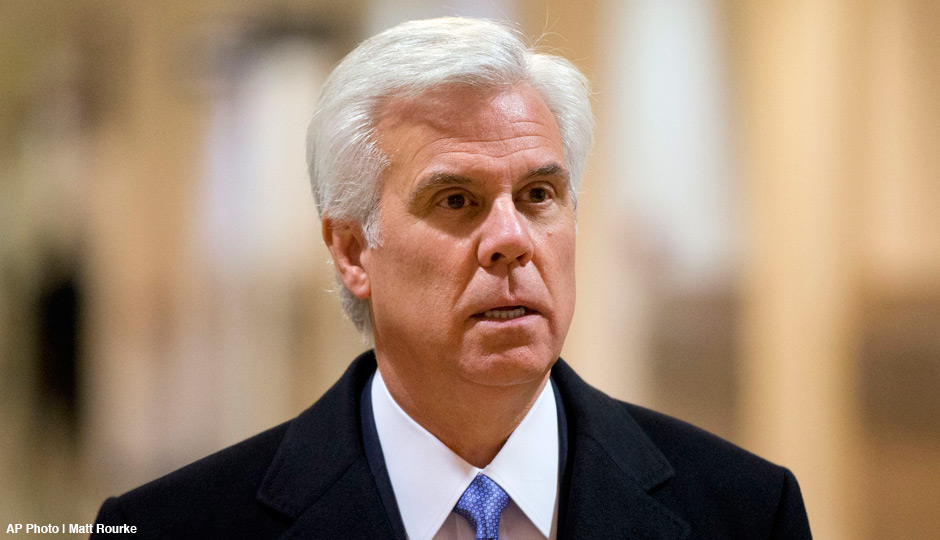It’s Time to End the Inky Ownership Battle
 If you care about Philadelphia’s newspapers — if you want to see the Inquirer and Daily News on the stands at your local Wawa, say, five years from now — let me suggest, ever so gently, that you root against Lewis Katz and Gerry Lenfest today as they head into yet another court showdown with the other owners of Interstate General Media.
If you care about Philadelphia’s newspapers — if you want to see the Inquirer and Daily News on the stands at your local Wawa, say, five years from now — let me suggest, ever so gently, that you root against Lewis Katz and Gerry Lenfest today as they head into yet another court showdown with the other owners of Interstate General Media.
This, of course, means rooting for George Norcross, and that’s a difficult proposition to sell because, well, he’s George Norcross, and, well, what else is there to say? One might as well root for the Death Star.
But a quick analysis of today’s court hearing suggests that that continued chaos at the papers is the more likely outcome if Katz and Lenfest get their way. And I’m not sure the papers can survive much more chaos than the chaos they’ve lived through in the last decade. Everybody (and every institution) has a breaking point. That the Inquirer and Daily News don’t seem to have yet hit theirs is a remarkable accomplishment — one that should probably not be tested too much.
Here’s the scenario:
• The hearing today is to determine, possibly, how the current ownership of the Inquirer and Daily News will be dissolved. There are two options for doing so:
• The majority ownership group, led by Norcross, wants a “private” auction among the individual members of the ownership group. Essentially, he wants a chance to simply buy out the partners he no longer wants to be partnered with.
• The minority ownership group, led by Katz and Lenfest, want a “public” auction, open to everybody in the universe. Essentially, one that would put the papers up for sale again — the fifth time in the last decade — with no guarantee that any of the owners currently in place would still have a spot at the table.
The other problem? The public auction process is designed — in the words of Richard Sprague, the lawyer for Katz and Lenfest — for “securing the highest value for the company.” In other words, to make the papers as expensive as possible. But the papers, as currently constructed, possibly cannot withstand the pressure of being sold for the highest possible price: This is a company where even vague, unsubstantiated whispers of approaching profitability are greeted with fanfare.
So suppose Katz and Lenfest somehow win the auction. What money will they have left over to invest into the company? It’s not hard to surmise that Ed Rendell put so many people together for the current ownership group in part because no individual wanted to lose too much of their own wealth trying to save the property; a smaller ownership group is unlikely to have the same resources as the current, fractious one. Which means, probably, the more money spent upfront means there’ll be less available for daily operations later on.
And remember, the last Philadelphia newspaper owner to pay top price for the local newspapers was Brian Tierney, who went a half-billion into debt — and then spent the rest of his short, debt-ridden tenure at the paper cutting staff and sliding into bankruptcy.
Say Katz and Lenfest lose the auction; they’ve still forced the winner into the same financially constrained situation they avoided. And yes, the duo deny that’s a likely outcome of the public auction — maybe it wouldn’t happen! — but the recent worst-case scenario history of the papers suggests it’s a problem to be avoided at all costs.
Whether you still want to root for Katz and Lenfest depends, then, on your sense of the men as guardians of journalistic values. They’re the ones who started this fight, after all, in order to defend the position of Bill Marimow as editor of the Inquirer. But the evidence is otherwise flimsy on that front. (And it got flimsier last month when at least one obituary for Marjorie Katz, Lewis’s wife, seemed to present the duo as an intact nuclear family when it’s long been widely known and reported that Lewis Katz is dating Inky City Editor Nancy Phillips. Obituaries tend to be respectful of the deceased and their families, of course, but the ones involving public figures don’t often try to sell us an alternate universe. Who knows why this one did? It sure didn’t look good.)
There’s no reason to believe that Katz and Lenfest are motivated by any purpose other than civic pride in bidding for the newspapers. They’ve clearly been successful at the big things they’ve chosen to do in life. But their proposal raises questions; so does their stewardship of the papers: It’s simply difficult to discern how they can make the papers more stable. And that makes it difficult to hope they’ll succeed.
Follow @joelmmathis on Twitter.


